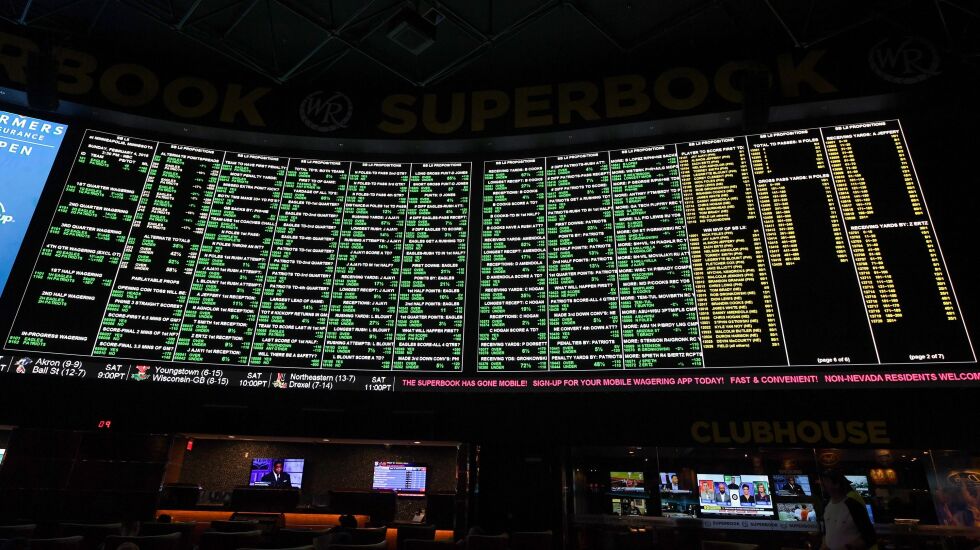
The first time there was an NFL betting scandal this offseason, Bears coach Matt Eberflus raced to address it with his team. The day after five Lions and one Commander were suspended for violating the NFL’s sports gambling rules in April, Eberflus reminded his team of the league policy.
In the wake of another controversy this week — Colts cornerback Isaiah Rodgers, who is under league investigation for violating the policy, said on social media Monday that he took “full responsibility” for his actions — Eberflus has reinforcements coming. As part of their leaguewide tour, NFL representatives will stop at Halas Hall next week to give a mandatory presentation about the league’s gambling rules. Their message: Just don’t bet.
“It’s hard to navigate because, you know, it’s hard to control other people’s actions,” Eberflus said this week. “But all you can do is educate and tell them the appropriate actions they can do with certain things.”
It’s new territory for the league, which inhales advertising money from sportsbooks — just watch any commercial break during the season — and the players, who live in states in which sports gambling has become increasingly legal. Thirty-three states plus Washington, D.C., have legalized and implemented sports gambling, with four more on the way. Sports gambling became legal in -Illinois four years ago this month.
Still, the NFL is walking a fine line. Owners profit from sports gambling ads knowing that a major betting violation by any player risks delegitimizing the outcome of their games.
Lions wide receiver Jameson Williams, the No. 12 pick in last year’s draft, said he wasn’t aware of the policy before being suspended six games in April. He was busted for betting from inside the Lions’ facility on a sporting event that wasn’t an NFL game.
Teammates Quintez Cephus and C.J. Moore, along with the Commanders’ Shaka Toney, were suspended at least one season after betting on NFL games. The Lions cut Cephus and Moore as well as Stanley Berryhill, who, like Williams, was handed a six-game suspension.
Losing paychecks — if not your career — isn’t worth it. And ignorance of the policy is no excuse.
“You’ve got to be aware of the rules,” Bears tight end Cole Kmet said. “Obviously, the payoff doesn’t really make much sense. If you’re an NFL football player betting on a game, the money you get playing a game vs. betting on a game doesn’t really equate well.”
Players are forbidden from betting on NFL games, fixing contests and giving confidential information for betting purposes.
They can gamble on other sports in states in which it’s legal, but they can’t do so from their phones inside a team facility — such as a locker room, practice field, team hotel or charter plane — or while traveling for team or league business.
Players can’t walk into a sportsbook at any time during the season, though reasonable exceptions are allowed if they’re passing by to reach a permissible area of a casino or -hotel. They can participate in legal non-sports gambling such as casino blackjack or poker during the season, so long as it’s not while traveling for league business. That’s where it can get murky: A Raiders player can play roulette on the Las Vegas Strip during the season in his free time. A Bears player in town to play the Raiders, though, can’t do the same because he’s in Las Vegas on team business.
Kmet was told about that particular wrinkle from a union representative.
“I didn’t know that — not that I would go to a casino the night before [a game],” Kmet said. “There’s nuances to the rule you’re not aware of. . . . It was good to kinda get educated on it.”
Players must report gambling debt of more than $10,000 to the NFL’s security department.
Gambling rules are even stricter for team employees who aren’t players — and whose rights aren’t protected by the NFLPA. Those employees, which include coaches and executives, can’t bet on any sport at any time.
The NFL determines the length of suspension for players who violate the policy — the punishment isn’t collectively bargained.
Asked about his awareness of the gambling rules, Bears cornerback Jaylon Johnson’s first thoughts went to taking a chance by undercutting a route to try for an interception.
No, he was corrected: wagering.
“I really don’t care to do it,” he said. “I mean, unless I’m shooting dice or something, I don’t do too much gambling. Personally for me, we definitely go over it — there’s the education of it.”







